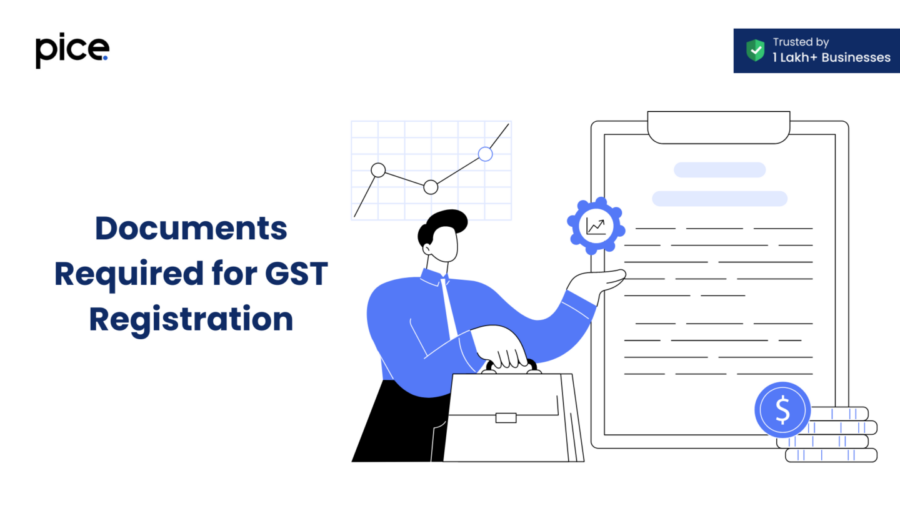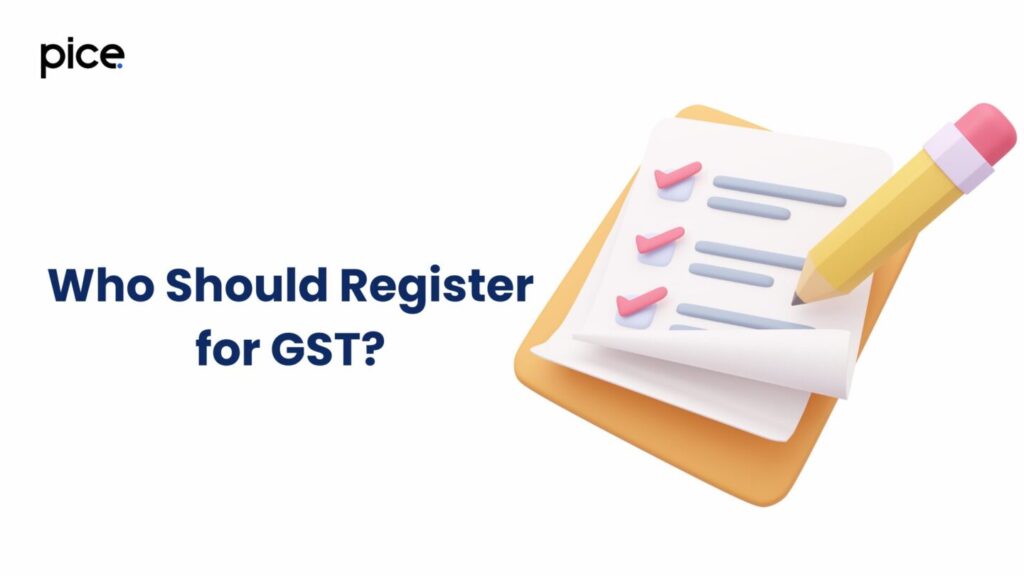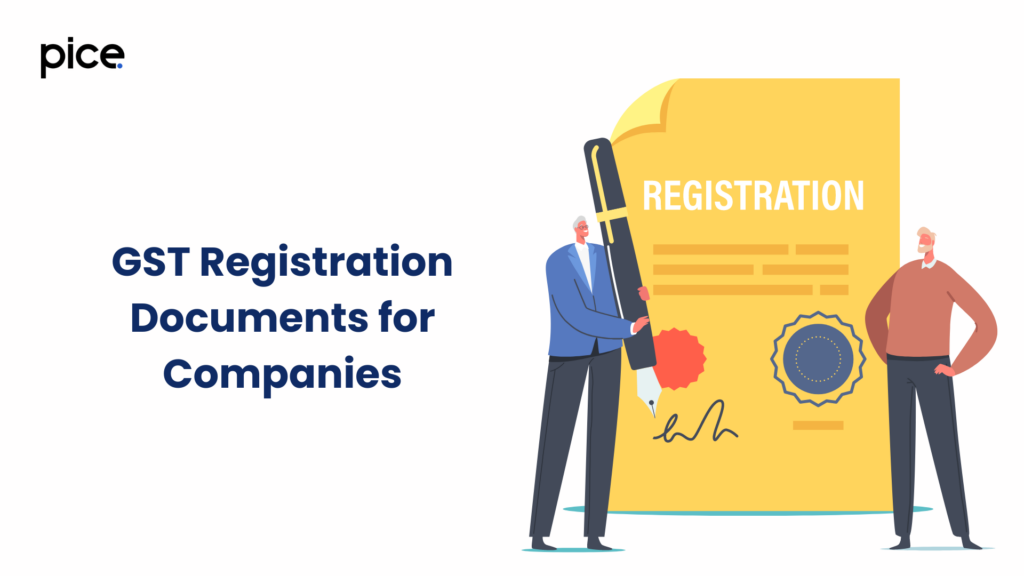Documents Required for GST Registration: Goods and Services Tax
- 29 Aug 24
- 8 mins

Documents Required for GST Registration: Goods and Services Tax
Key Takeaways
- Mandatory GST Registration: Businesses with an annual turnover exceeding ₹40 lakh (₹20 lakh in hilly/northeastern states) must register for GST.
- Different GST Registration Types: There are various GST registration categories, such as Normal Scheme, Composition Scheme, Input Service Distributor, Casual Taxable Person, and Non-resident Taxable Person.
- Essential Documents for Registration: Key documents required for GST registration include PAN card, Aadhaar card, proof of address, and bank statements, varying by business type.
- Step-by-Step Registration Process: The GST registration process involves filling out Form GST REG-01 on the GST portal, providing essential details, and submitting required documents for verification.
- Professional Guidance Recommended: Consulting with experts can help navigate the GST registration process and ensure all necessary documents are up-to-date and correctly submitted.
Every business owner must have complete knowledge of how they should register for Goods and Services Tax (GST). Now before planning the process, you must be aware of the documents required for GST registration. This generally includes your Aadhaar card, PAN card, proof of primary address and so on.
Here you can gain more knowledge regarding the common documents needed for GST registration according to the category of your business.
Who Should Register for GST?

The GST Act, of 2017 mandates that businesses with an annual aggregate turnover of ₹40 lakh or more have to apply for GST registration. In hilly states and the northeastern part of India, the threshold for GST registration is ₹20 lakh turnover.
Precisely speaking, the following entities must hold their unique 15-digit GSTINs:
- Individuals with taxability involving reverse charge
- Non-resident regular taxpayers
- Individuals participating in the inter-state taxable supplies of goods and services
- Individuals who are entitled to tax exemptions under Section 37
- All e-commerce operators
- All distributors of input services
- Aggregators who supply services under a new trade name or brand name
- Any group of people who are notified by the Government (State/Central) after the GST Council’s recommendations
In case you sell products within the same state then you must opt for GST registration if your actual turnover is greater than ₹20 lakh. For intra-state suppliers of services, this threshold has been set as ₹40 lakh turnover.
Category of GST Registration
Depending on the annual turnover and the type of business, the GST registration categories tend to differ. Here are the various GST registration types:
- Normal Scheme GST Registration
Most business owners register their businesses under this category which requires a minimum turnover of ₹40 lakh for product-based supplies and ₹20 lakh for services. In this case, you must file GST returns every month or quarter as per your preference. The return filing is directly related to the tax amount that you are liable to pay.
- Composition Scheme Registration
Small businesses with a turnover below ₹1.5 crore are eligible for this simplified scheme. The revenue threshold is ₹50 lakh for service providers. Under this program the registered taxpayer must pay GST at a fixed rate and stick to quarterly IT returns.
- Input Service Distributor Registration
Supplier offices that receive tax invoices for input services and distribute the ITC among their other branches can qualify for this exclusive GST registration category.
- Casual Taxable Person Registration
It is a temporary registration method for individuals who engage in an occasional supply of services and goods within their state. These people do not have a fixed business address. This registration time limit is for 90 days or until the end of the supply period, whichever happens first.
- Non-resident Taxable Person Registration
If you are an Indian taxpayer who currently lives outside India but supplies goods/services to the country then this registration type suits your profile. The validity of this authorisation lasts for 90 days or only during the period of supply, whichever is earlier.
What Are the Main Documents Required for GST Registration?
Here is the complete GST registration documents checklist for normal taxpayer registration (including government departments, ISD registrations and composite dealers):
- PAN card of company (if it is a company)
- Memorandum of Association/Articles of Association
- Certificate of Incorporation given by Ministry of Corporate Affairs/Proof of constitution of business
- Aadhaar card/PAN card of authorised signatory (the authorised signatory must be an Indian even if the taxpaying company is registered in a different country)
- PAN card and address proof of all the Company Directors along with their recent photographs
- Proof of appointment of the authorised signatory
- Address proof of the business
- Bank statement
For address proof in the normal category, you can upload either an electricity bill copy or the property tax receipt. Even the municipal khata copy is accepted as valid address proof. However, the list of documents required for GST registration varies, based on differing business structures.
GST Registration Documents for Individuals and Sole Proprietors
When applying for GST registration as an individual or sole proprietor, you must provide the following documents to verify your identity and business details.
- Aadhaar Card
- PAN card of the owner
- Owner’s recent photograph
- Bank account details
- Address proof of the business (can be a rental agreement)
GST Registration Documents for Partnerships and Limited Liability Partnerships (LLPs)
For partnerships and LLPs seeking GST registration, the following documents are required.
- PAN card of all the business partners (this includes the PAN card of the managing partner and authorised signatory)
- Partnership deed copy
- Aadhaar card of authorised signatory
- Recent photographs of all partners and authorised signatories
- Proof of appointment of authorised signatory
- Address proof of partners (Voter ID card, Aadhaar card, driving licence, passport)
- Board resolution of LLP/ registration certificate (applicable to LLPs only)
- Bank details
- Address proof documents of the business headquarters
GST Registration Documents for Hindu Undivided Families (HUFs)
When Hindu Undivided Families (HUFs) apply for GST registration, they must provide the following set of documents.
- PAN card of HUF
- Photograph of the owner
- Karta’s Aadhaar card and PAN card
- Address proof of the central place of business
- Bank account details
GST Registration Documents for Companies
The following are the GST registration documents for companies (public/ private/ Indian/ foreign company):

- PAN card of the company
- Certificate of Incorporation
- Aadhaar and PAN cards of the authorised signatory
- Articles of Association/ Memorandum of Association
- Address proof and PAN card of all the company directors
- Authorised signatory board resolution outcome stating the authorised signatory
- Recent photographs of the directors
- Address proof of the principal business location
- Bank account details
GST Registration Documents for Societies or Clubs
Societies or clubs need to submit the following documents during the GST registration procedure.
- Certificate of Registration of Society, Trust, Club or AOP
- Constitution or Bye-laws
- Address proof of the trust/ AOP/ society
- PAN card of the society/ trust/ AOP
- Proof of identity of the authorised signatory
- Digital Signature Certificate (DSC)
- Bank account details of the society/ trust/ AOP
- Letter of Authorisation
Business Registration Procedure Under GST
For business registration under GST, first,, you must provide the following essential details:
- Primary mobile number
- Email address
- Your State or Union Territory
You can fill up these personal details in Part A of Form GST REG-01 on the GST portal. Next, you have to wait until your details get verified. After that, you are issued a temporary reference number.
After receiving the temporary GST registration number, kindly follow these steps:
Step 1: Enter the temporary registration number in Part B of Form GST REG-01.
Step 2: Attach the documents required for GST registration as per the nature of your business.
Step 3: Save a copy of the Form GST REG-02 (acknowledgement form).
Once you go through the above steps, if your application gets verified, the registration process will be successful. Following this, you will be assigned a 15-digit unique GSTIN and receive a GST registration certificate.
Conclusion
Getting help from a team of seasoned experts is often advised for the GST registration process. As you rely on the professionals, they can guide you on how to manage the updated documents required for GST registration. These aspects vary significantly based on the nature of business and thus require expert guidance.
💡If you want to pay your GST with Credit Card, then download Pice Business Payment App. Pice is the one stop app for paying all your business expenses.
 By
By 

















